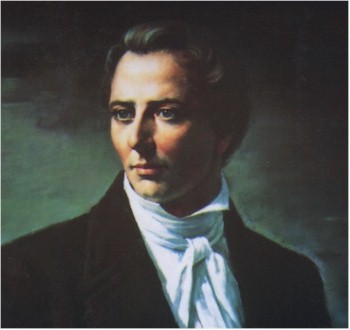 |
| Nephites vs Lamanites |
Also, I found an interesting section that can relate to Manifest Destiny. On page 530, Mormon was explaining how the Nephites (him included) were trying to defend themselves against the Lamanites and in constant retreat from them that "we marched forth and came to the land of Joshua, which was in the borders west, by the seashore." Again, in the way I was reading this, I believe that the Mormons reading this would identify with the Nephites. Nephi was a predominant character and writer in this book, and was a good man, so I think the mormons would believe that their Mormon ancestors were the Nephites. Also, the fact that all the Nephites were killed off, as seemingly martyrs, they would even connect with them more possibly. So, the fact that the Nephites traveled all the way to the West Coast could reaffirm the idea that America, or Mormons, needed to gain their land back from the Native Americans because they drove the Nephites away.
Also, I found some similarities with Baha'u'llah at the beginning of this book as well. Mormon writes,
But wickedness did prevail upon the face of the whole land, insomuch that the Lord did take away his beloved disciples, and the work of miracles and of healing did cease, because of the iniquity of the people.... And I did endeavor to preach unto this people, but my mouth was shut, and I was forbidden that I should preach unto them; for behold they had willfully rebelled against their God, and the blessed disciples were taken away out of the land, because of their iniquity (529).This quote reminds me of Baha'u'llah, because it makes it seem as though these Americans were in a dark period with respects to religion, which is something that Baha'u'llah believes. The Baha'i believe that religion is ever changing; there are waves of heavy presence of God and a thriving following of a prophet, and there are also dark times when God is not as present and the world is in more of a transitional time. The Nephites and Lamanites were in a transitional time here. Also, it seems as though Mormon himself wanted to become a prophet and preach to the people, but he was shut down and ignored. The Baha'i believe that one of the worst things to do is to deny a new prophet. This could relate to the state of America at the time Joseph Smith was writing. He could have viewed America as in a transition phase. He was witnessing many different religions believing different things and he was seeing many people attack Native Americans too. He could have written this story as a reflection of their present state all the way back into 400AD. Also, maybe he was aligning himself with Mormon as well. Mormon was denied as a prophet at this time, and maybe Joseph Smith was being denied as a prophet himself.

No comments:
Post a Comment